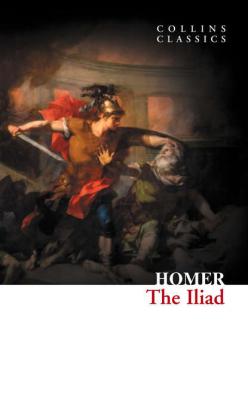The Iliad. Гомер
Читать онлайн.| Название | The Iliad |
|---|---|
| Автор произведения | Гомер |
| Жанр | Классическая проза |
| Серия | |
| Издательство | Классическая проза |
| Год выпуска | 0 |
| isbn | 9780007477388 |
He said; the monarch issued his commands;
Straight the loud heralds call the gathering bands
The chiefs inclose their king; the hosts divide,
In tribes and nations rank’d on either side.
High in the midst the blue-eyed virgin flies;
From rank to rank she darts her ardent eyes;
The dreadful aegis, Jove’s immortal shield,
Blazed on her arm, and lighten’d all the field:
Round the vast orb a hundred serpents roll’d,
Form’d the bright fringe, and seem’d to burn in gold,
With this each Grecian’s manly breast she warms,
Swells their bold hearts, and strings their nervous arms,
No more they sigh, inglorious, to return,
But breathe revenge, and for the combat burn.
As on some mountain, through the lofty grove,
The crackling flames ascend, and blaze above;
The fires expanding, as the winds arise,
Shoot their long beams, and kindle half the skies:
So from the polish’d arms, and brazen shields,
A gleamy splendour flash’d along the fields.
Not less their number than the embodied cranes,
Or milk-white swans in Asius’ watery plains.
That, o’er the windings of Cayster’s springs,
Stretch their long necks, and clap their rustling wings,
Now tower aloft, and course in airy rounds,
Now light with noise; with noise the field resounds.
Thus numerous and confused, extending wide,
The legions crowd Scamander’s flowery side;
With rushing troops the plains are cover’d o’er,
And thundering footsteps shake the sounding shore.
Along the river’s level meads they stand,
Thick as in spring the flowers adorn the land,
Or leaves the trees; or thick as insects play,
The wandering nation of a summer’s day:
That, drawn by milky steams, at evening hours,
In gather’d swarms surround the rural bowers;
From pail to pail with busy murmur run
The gilded legions, glittering in the sun.
So throng’d, so close, the Grecian squadrons stood
In radiant arms, and thirst for Trojan blood.
Each leader now his scatter’d force conjoins
In close array, and forms the deepening lines.
Not with more ease the skilful shepherd-swain
Collects his flocks from thousands on the plain.
The king of kings, majestically tall,
Towers o’er his armies, and outshines them all;
Like some proud bull, that round the pastures leads
His subject herds, the monarch of the meads,
Great as the gods, the exalted chief was seen,
His strength like Neptune, and like Mars his mien;
Jove o’er his eyes celestial glories spread,
And dawning conquest played around his head.
Say, virgins, seated round the throne divine,
All-knowing goddesses! immortal nine!
Since earth’s wide regions, heaven’s unmeasur’d height,
And hell’s abyss, hide nothing from your sight,
(We, wretched mortals! lost in doubts below,
But guess by rumour, and but boast we know,)
O say what heroes, fired by thirst of fame,
Or urged by wrongs, to Troy’s destruction came.
To count them all, demands a thousand tongues,
A throat of brass, and adamantine lungs.
Daughters of Jove, assist! inspired by you
The mighty labour dauntless I pursue;
What crowded armies, from what climes they bring,
Their names, their numbers, and their chiefs I sing.
THE CATALOGUE OF THE SHIPS.
The hardy warriors whom Boeotia bred,
Penelius, Leitus, Prothoenor, led:
With these Arcesilaus and Clonius stand,
Equal in arms, and equal in command.
These head the troops that rocky Aulis yields,
And Eteon’s hills, and Hyrie’s watery fields,
And Schoenos, Scholos, Graea near the main,
And Mycalessia’s ample piny plain;
Those who in Peteon or Ilesion dwell,
Or Harma where Apollo’s prophet fell;
Heleon and Hyle, which the springs o’erflow;
And Medeon lofty, and Ocalea low;
Or in the meads of Haliartus stray,
Or Thespia sacred to the god of day:
Onchestus, Neptune’s celebrated groves;
Copae, and Thisbe, famed for silver doves;
For flocks Erythrae, Glissa for the vine;
Platea green, and Nysa the divine;
And they whom Thebe’s well-built walls inclose,
Where Myde, Eutresis, Corone, rose;
And Arne rich, with purple harvests crown’d;
And Anthedon, Boeotia’s utmost bound.
Full fifty ships they send, and each conveys
Twice sixty warriors through the foaming seas.
To these succeed Aspledon’s martial train,
Who plough the spacious Orchomenian plain.
Two valiant brothers rule the undaunted throng,
Ialmen and Ascalaphus the strong:
Sons of Astyoche, the heavenly fair,
Whose virgin charms subdued the god of war:
(In Actor’s court as she retired to rest,
The strength of Mars the blushing maid compress’d)
Their troops in thirty sable vessels sweep,
With equal oars, the hoarse-resounding deep.
The Phocians next in forty barks repair;
Epistrophus and Schedius head the war:
From those rich regions where Cephisus leads
His silver current through the flowery meads;
From Panopea, Chrysa the divine,
Where Anemoria’s stately turrets shine,
Where Pytho,
